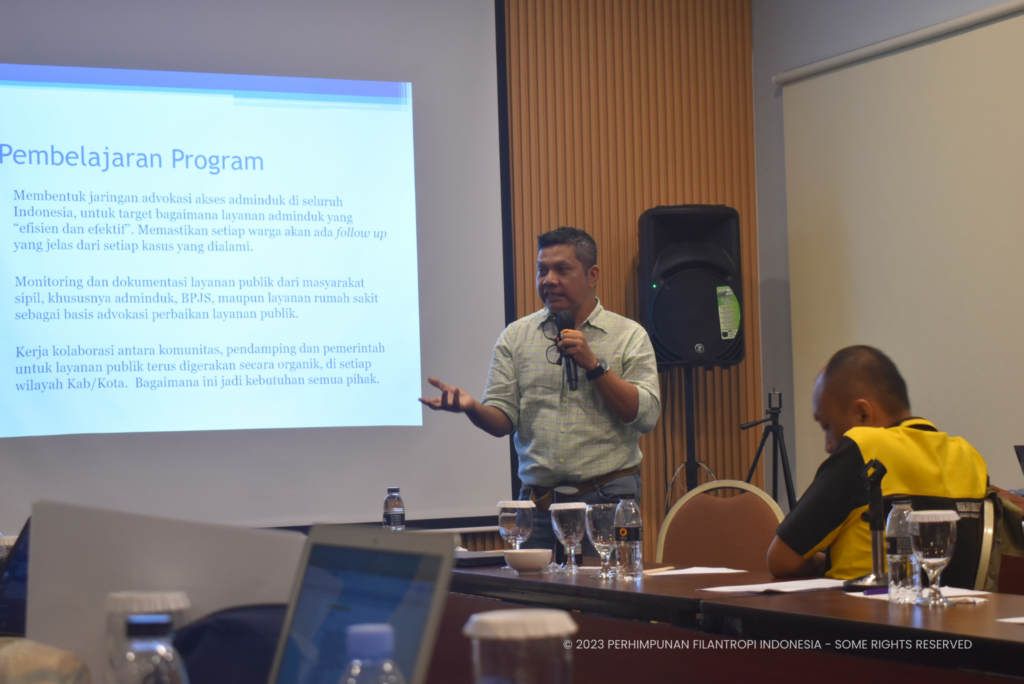Health Access Coalition Collaborative Initiative Workshop for Indigenous Peoples and Vulnerable Groups

Access to healthcare is a fundamental human right, yet it is often impeded for indigenous peoples and other vulnerable groups due to a variety of challenges. Various stakeholders were involved in collaborative initiatives to improve healthcare access for marginalized communities. One such initiative is the Vaccination Access Coalition for Indigenous Peoples and Vulnerable Groups (the Vaccine Access Coalition), which was established at the behest of several Civil Society Organizations (CSOs) with a vested interest in safeguarding indigenous communities and vulnerable populations from contracting COVID-19 through the acceleration of vaccination access.
Following the successful completion of the vaccination program for Indigenous Peoples and Vulnerable Groups and the eventual end of the pandemic, the Coalition for Vaccine Access, situated in Jakarta, resolved on January 30, 2024, to rebrand itself as the Health Access Coalition. A coalition members’ meeting attended by the Filantropi Indonesia, HWDI, LTKL, OHANA, PEKKA, PIRAC, PPMN, WALHI, and KPA marked the agreement to form this new coalition.
The Coalition for Health Access for Vulnerable Groups and Indigenous Peoples in Indonesia will have a primary focus on helping access inclusive health services for indigenous peoples, people with disabilities, and other vulnerable groups. This workshop also invited REKAN Indonesia and Suara Kita to the panel discussion “Identification of Advocacy for NIK, BPJS and Health Access for Indigenous Peoples and Vulnerable Groups”. This activity also triggered the focus of other programs the Health Access Coalition would carry out.
Martha Tiana Hermawan, REKAN Indonesia, has a health advocacy and outreach program. REKAN Indonesia is a volunteer organization that gathers, builds, and maintains the enthusiasm and sincerity of community-based volunteers’ struggle for the health of the Indonesian people.
Hermawan conveyed the importance of National Health Insurance (JKN) for Aid Recipients (PBI). The obstacle to JKN is the registration deadline, which is determined by the BPJS law. The domino effect due to COVID-19 causes contributions to continue. Therefore, people need to pay fees first to reaccess health services.
Meanwhile, Hartoyo from Suara Kita said there was a need for village administration assistance for residents who did not have a residential address and NIK to access health care. Suara Kita also helped register the transgender community and others to obtain BPJS Employment.
Suara Kita is now encouraging transgender people to have BPJS Employment in the death claims program. This fund will later be managed as their social security fund. However, there were difficulties in the claim process because they did not have families. This issue brought Suara Kita to the Ministry of Manpower for advocacy.
From the panel discussion, there was a need for collaboration or cooperation between stakeholders to assist with the required programs. The Health Access Coalition would later have program focuses, including access to population administration (population administration), access to BPJS Health PBI and Mandiri, access to assistive devices for people with disabilities, and others.
On the same day, after the formation of the Health Access Coalition and the election of the coordinator, Rina Prasarani from HWDI was elected as the coordinator, and Nor Hiqmah from PIRAC as the representative. Later, the Health Access Coalition for vulnerable groups and Indonesian indigenous communities was introduced to the public at an appreciation event for the collaboration to accelerate COVID-19 vaccination the following day (31/1).



